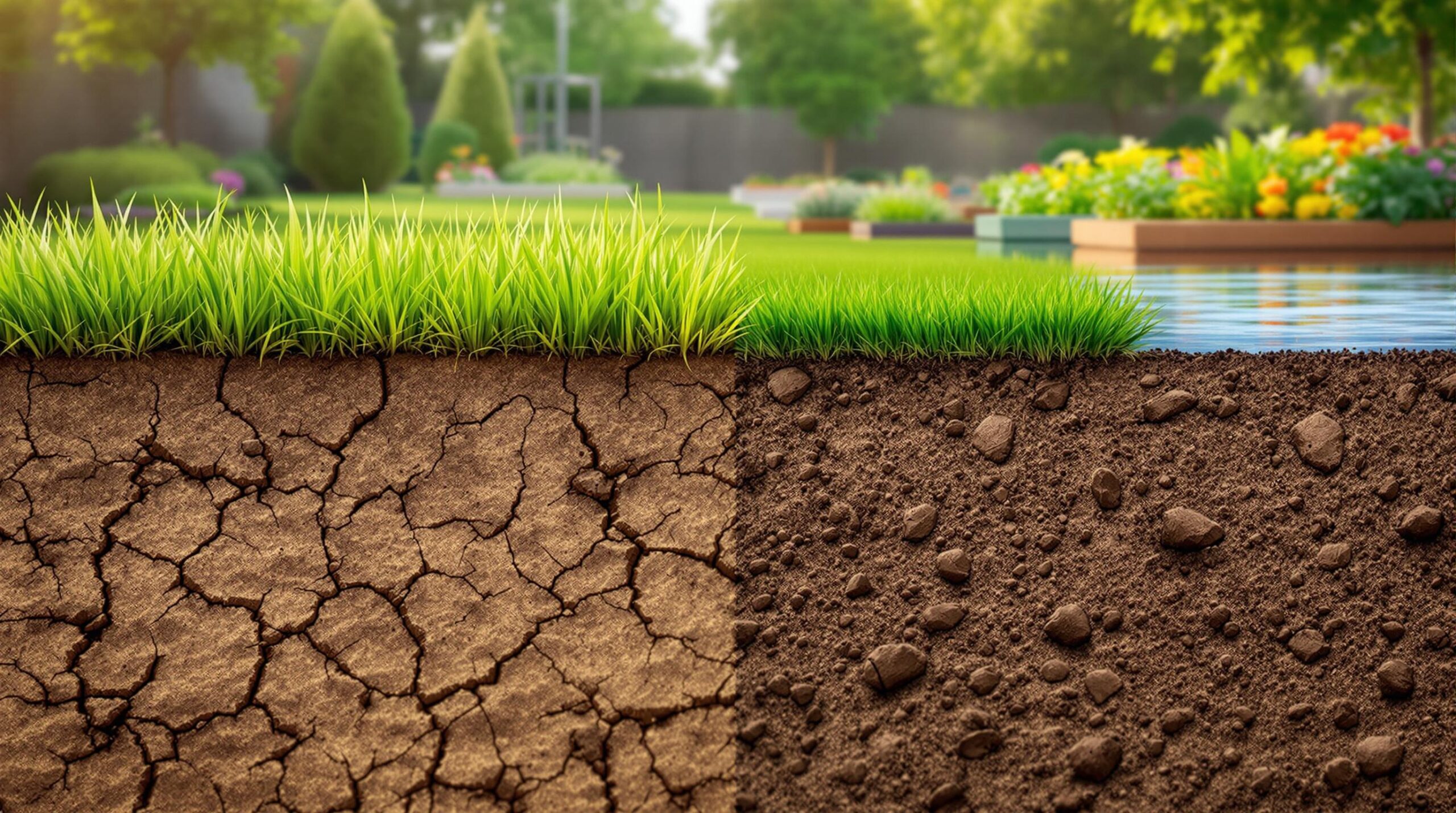- bhavya gada
- No Comments
Struggling with your Maryland yard? Common soil issues like compaction, poor drainage, missing nutrients, and pH imbalances can make maintaining a healthy lawn and garden tough. Here’s how you can tackle these problems:
- Soil Compaction: Use core aeration to loosen compacted soil for better root growth and water absorption.
- Drainage Issues: Install French drains, regrade, or create swales to manage water pooling.
- Nutrient Deficiencies: Test your soil and apply fertilizers or organic amendments like compost.
- Erosion: Use berms, swales, and retaining walls to prevent topsoil loss.
- pH Imbalances: Adjust with lime (to raise pH) or sulfur (to lower pH) based on soil test results.
- Sandy Soil Management: Add organic matter like compost and mulch to improve water retention.
- Urban Soil Challenges: Aerate, add screened topsoil, and test for contaminants.
Start with a soil test to pinpoint specific issues and apply targeted solutions. Fixing these problems ensures a healthier, more vibrant yard.
The Soils of Maryland
1. Soil Compaction
Soil compaction happens when heavy pressure compresses the ground, squeezing out air and water. This creates dense layers that restrict root growth and lead to water pooling [1]. You might notice standing water, patchy grass, or soil that’s tough to dig through – clear signs of compaction. This issue can disrupt the healthy, vibrant lawns and gardens many Maryland homeowners aim for.
For lighter cases, using a manual core aerator can help loosen the soil. But when the problem is more severe, professional solutions are often necessary. Pro Landscapes MD offers services like installing French drains, regrading, and adding pipe drains to fix compaction and restore the soil’s structure.
Addressing compaction also improves drainage, making it easier for your lawn to thrive.
2. Water Drainage Issues
Once soil compaction is addressed, the next step is managing excess water around your yard. A key warning sign? Water pooling after rain. This can lead to flooding, soil erosion, and even damage to your home’s foundation.
Natural vs. Engineered Drainage
For small areas of pooling, natural solutions like berms or swales work well to guide water away while also minimizing erosion. However, if you’re dealing with larger volumes of water or areas with persistent standing water, engineered drainage systems are often the better choice.
At Pro Landscapes MD, we specialize in installing effective drainage solutions, including:
- French drains: Redirect underground water in low-lying areas.
- Pipe drains: Manage heavy stormwater on larger properties.
- Land regrading: Correct slopes to stop water from collecting.
- Dry riverbeds: Combine functionality with aesthetic appeal.
Our team evaluates your yard and installs custom drainage systems designed to keep your property protected for the long term.
3. Missing Soil Nutrients
After addressing drainage, make sure to evaluate soil nutrients before planting. Conduct a soil test to identify any deficiencies in nitrogen, phosphorus, and potassium. Pro Landscapes MD creates customized fertilizer plans based on your soil test results, ensuring these key nutrients are replenished for consistent soil health throughout the year [1]. Additionally, techniques like efficient irrigation and using organic soil amendments can improve nutrient availability while helping to conserve water [1].
4. Soil Erosion Problems
Erosion can wash away the nutrient-rich soil you’ve worked hard to restore. In Maryland, the combination of uneven terrain and frequent heavy rains makes this issue even worse. The result? Water damage, flooding, and costly landscape repairs.
When water flows down slopes or collects in low areas, it strips away topsoil, leaving behind bare patches, rills, or gullies. This process also drains the soil of essential nutrients that plants and grass need to develop strong roots [1].
Here are some effective ways to manage runoff and control erosion:
- French drains and swales: Help redirect excess water.
- Berms: Slow down water flow.
- Regrading: Adjusts the slope of your land to manage water direction.
- Retaining walls: Provide stability for steep areas.
A combination of these strategies, customized to your landscape, can help protect your soil and prevent further erosion.
5. Imbalanced Soil pH
Soil chemistry plays a big role in plant health, just like physical erosion. The pH scale (ranging from 0 to 14) affects how nutrients are absorbed by plants. Most ornamental plants in Maryland grow best in soil with a pH between 6.0 and 7.0. However, local soils often lean acidic (below 6.0), which can lead to yellowing leaves, sluggish growth, and weak flowering.
To keep your soil in check, test its pH every 2-3 years. If the pH is too low, agricultural lime can help raise it. If it’s too high, elemental sulfur can bring it down. Mix these amendments into the soil, water thoroughly, and retest after six months to see the results.
sbb-itb-843f8be
6. Sandy Soil Management
Once you’ve adjusted the pH, it’s time to address soil texture. Sandy soils can be tricky – they drain quickly, lose nutrients, and dry out faster than other types. A recent soil test will help you figure out how much organic matter your soil needs before making any changes.
Here are some effective ways to improve sandy soil:
- Add compost or aged manure: These materials help the soil hold onto water and nutrients.
- Use mulch: Spread a 2–3 inch layer to keep moisture in and protect against temperature changes.
- Set up drip irrigation or soaker hoses: These systems provide consistent, targeted watering.
Pro Landscapes MD offers tailored soil-amendment plans and handles organic matter installation for sandy landscapes [1].
7. Urban Soil Quality
Urban soils often come with their own set of problems. Construction projects leave behind fill soil that’s compacted, mixed with debris, and lacking in nutrients. On top of that, contaminants like heavy metals or hydrocarbons can sometimes be present.
Start by conducting a detailed soil test. This should include checking pH levels, N-P-K (nitrogen, phosphorus, potassium) content, and scanning for potential contaminants. To improve compacted areas, try core aeration or rototilling. Follow this by mixing in at least 6 inches of screened topsoil and well-aged compost to restore nutrients. Adding mulch to exposed areas can help retain moisture and rebuild organic matter. For larger issues like heavy compaction or contamination, consider reaching out to Pro Landscapes MD for soil replacement and land-leveling services [1].
Testing Your Soil
Before tackling compaction, drainage, or nutrient issues, it’s important to test your soil. A professional soil test gives you detailed insights into your yard’s specific problems, helping you choose the right amendments and treatments instead of relying on guesswork.
The process is simple but essential for reliable results:
- Collect 5–10 soil cores, each about 3–4 inches deep, from various areas in your yard.
- Combine the cores in a clean bucket and mix thoroughly. Fill the lab kit to the marked line.
- Send the sample to a state-certified lab for analysis of pH, N-P-K (nitrogen, phosphorus, potassium), and micronutrients [1].
This data helps you focus on the exact problem – whether it’s pH imbalance, nutrient deficiencies, or soil texture. Pro Landscapes MD can assist in interpreting your results and applying the right solutions based on the lab findings [1].
Your lab report will guide the specific amendments discussed in the next section.
Fixing Maryland Soil Problems
Once you have your soil test results, you can address specific issues effectively:
Compaction Solutions
For soil that’s moderately compacted, core aeration in early fall or spring can loosen it up. This process breaks apart dense layers, improves drainage, and promotes deeper root growth. If the compaction is severe, professional-grade equipment is needed for deep aeration. Pro Landscapes MD offers specialized aeration and grading services to restore your soil’s structure.
Drainage Improvements
Notice rainwater sitting in your yard for more than a day after a storm? That’s a sign of poor drainage. Solutions include installing French drains, box-and-pipe systems, or dry riverbeds. You can also regrade slopes or shape berms and swales to direct runoff and prevent water damage.
Nutrient Management
Use amendments based on your lab results. This could mean applying slow-release fertilizers or organic minerals to bring your soil’s fertility back into balance.
Reach out to Pro Landscapes MD for a consultation and take the first step toward healthier soil and a vibrant landscape all year long.
Professional Soil Services
When DIY efforts aren’t enough, Pro Landscapes MD provides expert soil services tailored for central Maryland homeowners.
If you’re dealing with ongoing issues like soil compaction, poor drainage, or erosion, professional help can make all the difference:
What Pro Landscapes MD Offers:
-
Advanced Drainage Solutions
We design custom French drains, berms, and swales to manage water runoff, prevent erosion, and safeguard your home’s foundation [1]. -
Grading and Leveling
Got uneven slopes or erosion problems? Our grading and leveling services reshape your yard for proper water flow and stability [2]. -
Eco-Friendly Soil Management
Using options like permeable pavers, dry riverbeds, and native plants, we improve water infiltration and restore soil quality.
We don’t just stop at quick fixes. By combining these methods, we create lasting solutions for your landscape. Get in touch with Pro Landscapes MD to schedule a soil assessment and develop a custom plan for your yard.
Next Steps
Now that you’ve explored testing and treatment options, it’s time to rely on experts to get the job done right. With a detailed soil analysis and tailored solutions ready, let Pro Landscapes MD turn your vision into reality. Reach out to Pro Landscapes MD for a free soil assessment, a customized treatment plan, and professional installation to create a thriving, durable yard you’ll love.
FAQs
How can I identify if my yard has compacted soil?
Compacted soil can make it difficult for water, air, and nutrients to reach plant roots, leading to unhealthy lawns and gardens. Signs of soil compaction include poor drainage, water pooling after rainfall, stunted plant growth, or areas of your yard where grass struggles to grow. Additionally, if you notice soil that feels hard and dense when you try to dig, it could be compacted.
To address soil compaction, consider aerating your lawn, which helps loosen the soil and improves its health. If you’re unsure or need professional assistance, Pro Landscapes MD offers expert landscaping services to restore and revitalize your yard.
How can I fix drainage problems in my yard?
Fixing drainage problems in your yard often involves addressing issues like standing water, poor runoff, or uneven grading. Solutions include installing French drains, dry riverbeds, or drain pipes, as well as regrading or leveling the land to improve water flow. These methods help prevent water pooling and protect your landscape from damage.
Pro Landscapes MD specializes in effective drainage solutions tailored to Maryland’s unique soil conditions. Their services include stormwater management, yard leveling, and drainage system installation, ensuring your outdoor space stays healthy and functional year-round.
How often should I test my soil for nutrients and pH levels in Maryland?
Testing your soil for nutrient levels and pH is essential to maintaining a healthy yard, especially in Maryland, where common issues like compaction and poor drainage can affect soil quality. Ideally, you should test your soil every 2 to 3 years, or more frequently if you notice issues like poor plant growth, yellowing leaves, or water pooling in your yard.
Regular testing helps identify nutrient deficiencies or imbalances and ensures your soil’s pH is optimal for plant health. For the best results, test your soil during the fall or early spring before planting or fertilizing.


















Chat with Us